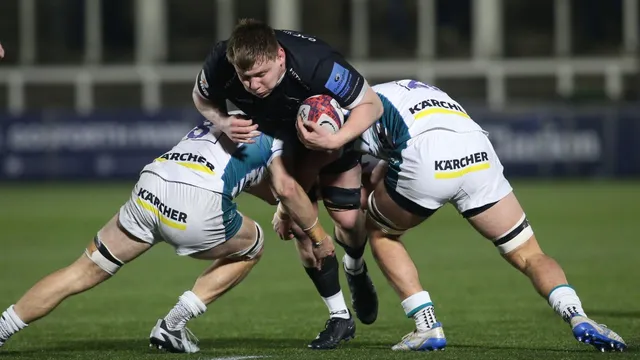
Newcastle Falcons face financial crisis amid loan talks for survival
2025-03-18 17:00- Newcastle Falcons face financial struggles, reporting losses of £11.4 million last year.
- The club is in discussions with other Premiership teams and CVC Capital Partners for a potential loan.
- The outcome of these discussions is crucial to ensure the Falcons can continue playing in the upcoming season.
Express your sentiment!
Insights
In a concerning situation for English rugby, Newcastle Falcons, currently at the bottom of the Gallagher Premiership table, are in urgent need of financial assistance. The club has reported a significant financial loss of £11.4 million for the last financial year. The Falcons have managed only two wins out of their eleven matches this season, indicating their struggles on the field as well as financially. To avert a crisis similar to that of London Irish, Wasps, and Worcester Warriors, who all went bankrupt in the 2022-23 season, the club’s financial stability is now under strict scrutiny by the league's Financial Monitoring Panel. Discussions are currently underway involving the other nine clubs in the Premiership and CVC Capital Partners, the private equity firm that owns a 27% stake in the league. These clubs are contemplating a loan estimated to be between £4 million and £5 million to help Newcastle Falcons meet the conditions set forth for participation in the upcoming season. The loan amount has not been definitively settled, but it is deemed crucial for the club's survival. Approval from the Department for Culture, Media and Sport (DCMS) is required for any funding agreement, illustrating the complexities surrounding financial governance within the league. The dire financial situation of the Falcons has drawn attention to broader funding concerns within the sport. Despite the introduction of private investment from CVC, many clubs continue to navigate financial difficulties. The Falcons, to manage their finances better, have made strategic cuts in player salaries—spending significantly below the salary cap yet still reporting substantial losses. This reveals a fundamental struggle within the league, balancing competitive performance while maintaining economic viability. As Newcastle endeavors to stabilize its finances, it also faces uncertainty concerning ownership. Semore Kurdi, the club's chairman since 2011, expressed in November his intention to sell the club, which complicates the current situation further. While some family offices have shown interest, there are no guarantees of imminent change. Meanwhile, the potential loan from the other clubs and CVC could prove to be a lifeline, but the pressing questions of investor interest and financial sustainability within rugby union remain critical.
Contexts
The recent wave of bankruptcies among rugby clubs has raised significant concerns regarding the sustainability and future of the sport within the Premiership league. As several clubs have faced financial difficulties, the implications of these failures extend beyond the immediate loss of teams. The fallout includes potential job losses for players and staff, reduced opportunities for emerging talent, and an overall weakening of the competitive landscape of the sport. This situation reflects deeper issues within the financial management of clubs and the reliance on external funding sources, which have become increasingly volatile. Moreover, the impact of the recent bankruptcies also jeopardizes the loyalty of fans, who may feel disillusioned by the instability of their clubs. The importance of a robust financial strategy is evident, as clubs must prioritize sustainable practices to safeguard their futures in the league. In addition to the direct impacts on the clubs, the bankruptcies can have extensive repercussions on the broader Premiership structure. A reduction in the number of active clubs could threaten the league's commercial appeal, impacting sponsorship deals, broadcasting rights, and overall revenue generation. The Premiership relies heavily on a full complement of competitive teams to attract audiences and sponsors, and the loss of clubs could diminish the brand value of the league itself. Furthermore, the competitive balance of the league may be altered as remaining clubs navigate this turbulent environment, raising questions about the fairness of competition and the strategic direction of the Premiership. Another critical aspect to consider is the ripple effect on grassroots rugby and community clubs. Many professional clubs serve as the backbone of local rugby ecosystems, providing pathways for young athletes and fostering community engagement. The financial struggles at the top levels can trickle down, limiting resources and support for lower-tier teams, ultimately affecting participation rates and the development of future talent. The sense of community fostered by local rugby clubs is at risk, and the bankruptcies could lead to a disengagement from the sport at multiple levels, further complicating the revival of rugby's popularity in the UK. To stabilize the Premiership and prevent further bankruptcies, a comprehensive approach is needed. This involves assessing the financial structures of the clubs, encouraging transparent financial practices, and fostering collaboration among teams to share resources and best practices. Stakeholders, including governing bodies, club executives, and fans, must work together to create a sustainable model that ensures the longevity of the sport. League-wide reforms may also be required to address disparities in financial backing and ensure a level playing field. Ultimately, the resilience of the Premiership hinges on its ability to adapt to current challenges and implement measures that uphold the integrity and vibrancy of rugby in the face of adversity.